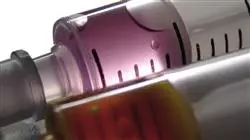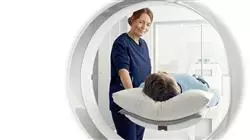University certificate
The world's largest faculty of medicine”
Introduction to the Program
Incorporate the most advanced diagnostic methods and interventions into your daily practice thanks to this program, with which you will be able to deepen your knowledge of issues such as targeted therapy with radioligands"

The disciplines of radiology and Nuclear Medicine have undergone major transformations in recent years, allowing the specialist to incorporate surgical techniques and diagnostic methods of great precision. Thus, these fields are two of the most advanced in medicine today, so the professional who wishes to keep up to date has to take an update program like this Advanced master’s degree in Nuclear Medicine and Radiodiagnostics.
This degree has been designed with the aim of offering physicians the most recent developments in these areas, so that they can integrate into their daily work the latest innovations in issues such as the treatment of cerebral vasospasm, the combined technique of BSGC and localization of occult lesion (SNOLL), teragnosis applied to neuroendocrine and gastroenteropancreatic tumors or breast cancer screening and the BI-RADS system, among many others.
All this, from a 100% online learning system that will adapt to the personal circumstances of the specialist, since they will be able to decide when, where and how to study, without having to submit to rigid schedules and without uncomfortable trips to an academic center. In addition, a teaching staff of great international prestige will accompany you throughout the entire process and will use numerous multimedia resources to make the program's educational itinerary more effective.
This program is developed in a 100% online format and will allow you to combine your work with your studies, without submitting to rigid schedules or requiring you to travel to an academic center"
This Advanced master’s degree in Nuclear Medicine and Radiodiagnostics contains the most complete and up-to-date scientific program on the market. The most important features include:
- Development of practical cases presented by experts in Nuclear Advanced master’s degree
- The graphic, schematic, and eminently practical contents with which they are created, provide scientific and practical information on the disciplines that are essential for professional practice
- Practical exercises where self-assessment can be used to improve learning
- Special emphasis on innovative methodologies in Nuclear Medicine and Radiodiagnostics
- Theoretical lessons, questions to the expert, debate forums on controversial topics, and individual reflection assignments
- Content that is accessible from any fixed or portable device with an Internet connection
Get updated thanks to the prestigious teaching staff selected by TECH, composed of working professionals who know all the latest developments in these specialized fields"
Its teaching staff includes professionals belonging to the field of medicine, who bring to this program the experience of their work, in addition to recognized specialists from prestigious reference societies and universities.
The multimedia content, developed with the latest educational technology, will provide the professional with situated and contextual learning, i.e., a simulated environment that will provide an immersive training experience designed to train for real-life situations.
This program is designed around Problem-Based Learning, whereby the student must try to solve the different professional practice situations that arise during the academic year. For this purpose, the professional will be assisted by an innovative interactive video system created by renowned and experienced experts.
You will learn about the latest advances in Nuclear Medicine applied to pediatrics, deepening in PET/PET-CT/PET-MRI techniques in pediatric and young adult patients"

The best multimedia materials are waiting for you: Video proceedings, interactive summaries, case studies, master classes"
Why study at TECH?
TECH is the world’s largest online university. With an impressive catalog of more than 14,000 university programs available in 11 languages, it is positioned as a leader in employability, with a 99% job placement rate. In addition, it relies on an enormous faculty of more than 6,000 professors of the highest international renown.

Study at the world's largest online university and guarantee your professional success. The future starts at TECH”
The world’s best online university according to FORBES
The prestigious Forbes magazine, specialized in business and finance, has highlighted TECH as “the world's best online university” This is what they have recently stated in an article in their digital edition in which they echo the success story of this institution, “thanks to the academic offer it provides, the selection of its teaching staff, and an innovative learning method aimed at educating the professionals of the future”
A revolutionary study method, a cutting-edge faculty and a practical focus: the key to TECH's success.
The most complete study plans on the university scene
TECH offers the most complete study plans on the university scene, with syllabuses that cover fundamental concepts and, at the same time, the main scientific advances in their specific scientific areas. In addition, these programs are continuously being updated to guarantee students the academic vanguard and the most in-demand professional skills. In this way, the university's qualifications provide its graduates with a significant advantage to propel their careers to success.
TECH offers the most comprehensive and intensive study plans on the current university scene.
A world-class teaching staff
TECH's teaching staff is made up of more than 6,000 professors with the highest international recognition. Professors, researchers and top executives of multinational companies, including Isaiah Covington, performance coach of the Boston Celtics; Magda Romanska, principal investigator at Harvard MetaLAB; Ignacio Wistumba, chairman of the department of translational molecular pathology at MD Anderson Cancer Center; and D.W. Pine, creative director of TIME magazine, among others.
Internationally renowned experts, specialized in different branches of Health, Technology, Communication and Business, form part of the TECH faculty.
A unique learning method
TECH is the first university to use Relearning in all its programs. It is the best online learning methodology, accredited with international teaching quality certifications, provided by prestigious educational agencies. In addition, this disruptive educational model is complemented with the “Case Method”, thereby setting up a unique online teaching strategy. Innovative teaching resources are also implemented, including detailed videos, infographics and interactive summaries.
TECH combines Relearning and the Case Method in all its university programs to guarantee excellent theoretical and practical learning, studying whenever and wherever you want.
The world's largest online university
TECH is the world’s largest online university. We are the largest educational institution, with the best and widest online educational catalog, one hundred percent online and covering the vast majority of areas of knowledge. We offer a large selection of our own degrees and accredited online undergraduate and postgraduate degrees. In total, more than 14,000 university degrees, in eleven different languages, make us the largest educational largest in the world.
TECH has the world's most extensive catalog of academic and official programs, available in more than 11 languages.
Google Premier Partner
The American technology giant has awarded TECH the Google Google Premier Partner badge. This award, which is only available to 3% of the world's companies, highlights the efficient, flexible and tailored experience that this university provides to students. The recognition as a Google Premier Partner not only accredits the maximum rigor, performance and investment in TECH's digital infrastructures, but also places this university as one of the world's leading technology companies.
Google has positioned TECH in the top 3% of the world's most important technology companies by awarding it its Google Premier Partner badge.
The official online university of the NBA
TECH is the official online university of the NBA. Thanks to our agreement with the biggest league in basketball, we offer our students exclusive university programs, as well as a wide variety of educational resources focused on the business of the league and other areas of the sports industry. Each program is made up of a uniquely designed syllabus and features exceptional guest hosts: professionals with a distinguished sports background who will offer their expertise on the most relevant topics.
TECH has been selected by the NBA, the world's top basketball league, as its official online university.
The top-rated university by its students
Students have positioned TECH as the world's top-rated university on the main review websites, with a highest rating of 4.9 out of 5, obtained from more than 1,000 reviews. These results consolidate TECH as the benchmark university institution at an international level, reflecting the excellence and positive impact of its educational model.” reflecting the excellence and positive impact of its educational model.”
TECH is the world’s top-rated university by its students.
Leaders in employability
TECH has managed to become the leading university in employability. 99% of its students obtain jobs in the academic field they have studied, within one year of completing any of the university's programs. A similar number achieve immediate career enhancement. All this thanks to a study methodology that bases its effectiveness on the acquisition of practical skills, which are absolutely necessary for professional development.
99% of TECH graduates find a job within a year of completing their studies.
Advanced Master's Degree in Nuclear Medicine and Radiodiagnostics
.
In recent years, disciplines such as radiology and nuclear medicine have evolved significantly, leading to major advances in the methods of diagnosis and approach to numerous pathologies. Thanks to this development, specialists can now resort to tools and procedures that facilitate their work and guarantee highly accurate results. However, in order to be able to operate these instruments and effectively integrate the latest developments into their daily practice, they must be prepared and update their technical skills. At TECH Global University we developed this Advanced Master's Degree in Nuclear Medicine and Radiodiagnosis, a postgraduate course through which you will be able to address the most important concepts, topics and issues of this branch of medicine and implement them in the daily management of patients in diagnostic and therapeutic radiology.
Specialize in clinical and healthcare management
.
Our Advanced Professional Master's Degree brings together in a comprehensive way the most advanced information, methods and resources to specialize you. Through a curriculum in a 100% online format, you will understand the particularities of the use of radionuclides in diagnostic and therapeutic methods; you will learn the new therapies of nuclear medicine and apply clinical and biochemical criteria to properly care for each of your patients; and you will contribute to the implementation of radiological techniques in the subspecialties of neurology, cardiology, gastroenterology, urology, traumatology, among others. From this, you will achieve professional success, stand out in a highly competitive field, and revalue your professional profile by applying your knowledge and skills in the daily practice of your functions.







